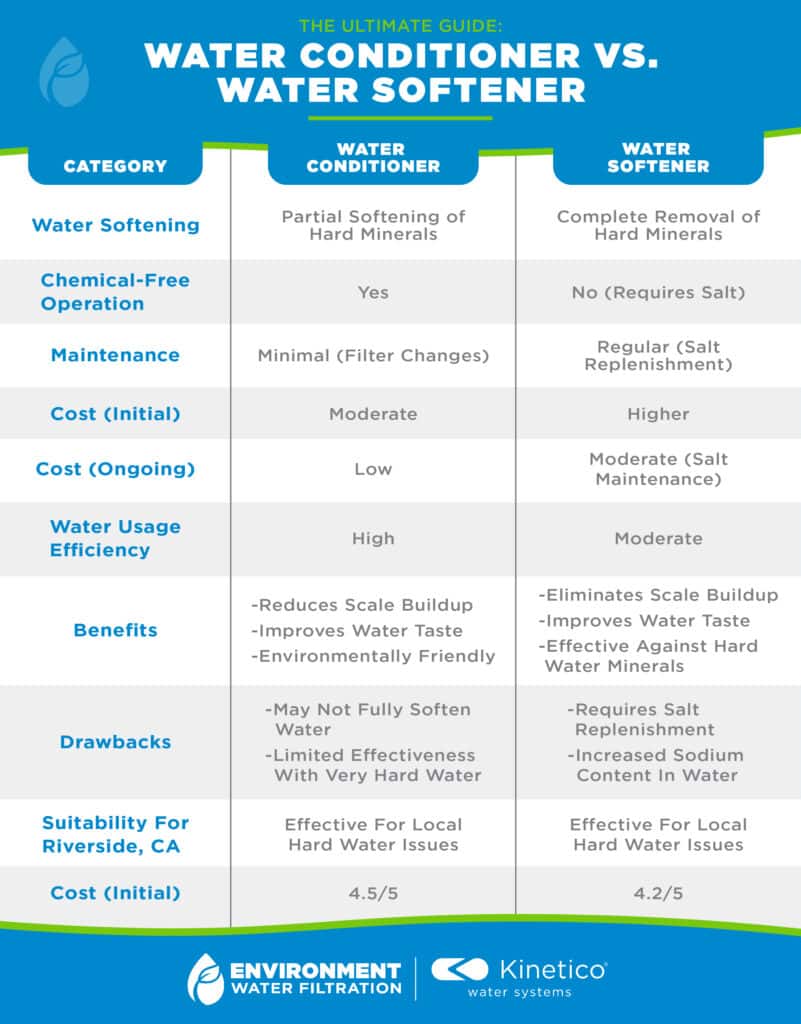The Right Water System For Your Riverside Home
Choosing the best water system for your household can significantly impact your water quality and daily living. Understanding the differences between water conditioners and water softeners is crucial to making an informed decision that meets your home’s needs.
At Environment Water Filtration, we understand every home is as unique as the people living in it. Below, we’ll walk you through the pros and cons of each system. Trust our team to help you determine which option is best for your household.
What Is A Water Conditioner?
A water conditioner is a system that improves water quality by changing the minerals in the water. Instead of removing minerals like calcium and magnesium completely, it uses technologies like special filters or electromagnetic waves to alter their structure. This process stops the minerals from sticking to surfaces and causing scale buildup.
Home water conditioner systems are known for their chemical-free operation, making them environmentally friendly and low-maintenance. They effectively reduce scale buildup in pipes and appliances, prolonging their lifespan and improving water flow efficiency.
How Does A Water Softener Work?
In contrast, a water softener is a system that removes hard minerals from water through a process called ion exchange. It replaces calcium and magnesium ions with sodium or potassium ions. This system effectively softens the water by reducing hardness levels.
Water softeners provide complete removal of hard minerals, ensuring softer water for bathing, cleaning and appliance longevity. They are highly effective in preventing scale buildup and improving soap lathering. These benefits can lead to significant savings on detergent and cleaning products over time.
Water Conditioners vs. Water Softeners: A Side-By-Side Comparison
When deciding between a water softener and a water conditioner for your Riverside home, consider the specific benefits each system offers. Investing in water technology for your home can mean enjoying cleaner dishes and laundry with less detergent, prolonging the lifespan of your appliances and plumbing fixtures.
It also means reducing the potential for scale buildup in your water heater, which can improve its efficiency and reduce energy costs over time. Additionally, choosing the right system ensures that you have consistent water quality throughout your home, providing peace of mind for your family’s health and comfort.

Water Softener Benefits
Water softeners deliver soft water that feels smoother on the skin and requires less soap and shampoo for bathing. They are highly effective in preventing scale buildup in pipes and appliances, which helps maintain fixture efficiency and extends the lifespan of household appliances.
Water Conditioner Benefits
Water conditioning systems provide a chemical-free solution to combating hard water issues. They reduce scale formation without altering the mineral content of water. These factors make it a preferred choice for homeowners concerned about sodium levels or environmental impact.
Additionally, conditioners require minimal maintenance and are generally more affordable upfront compared to water softeners.
The Downsides Of At-Home Water Systems
While both water conditioners and water softeners offer significant benefits, they also come with certain drawbacks to consider.
Water softeners require ongoing maintenance to replenish salt or potassium pellets and may increase sodium levels in water, which can be a concern for individuals on low-sodium diets. On the other hand, water conditioning systems may not completely eliminate hardness minerals. This can potentially allow some scale buildup over time.
Transform Your Water Quality With Environment Water Filtration
Choosing between a water conditioner and a water softener depends on your preferences for water quality, maintenance requirements and environmental considerations. At Environment Water Filtration, we understand the importance of finding the right solution for your home.
We’ll help you discover how our water systems can improve your water quality and enhance your daily life. Contact us today to schedule a consultation.




